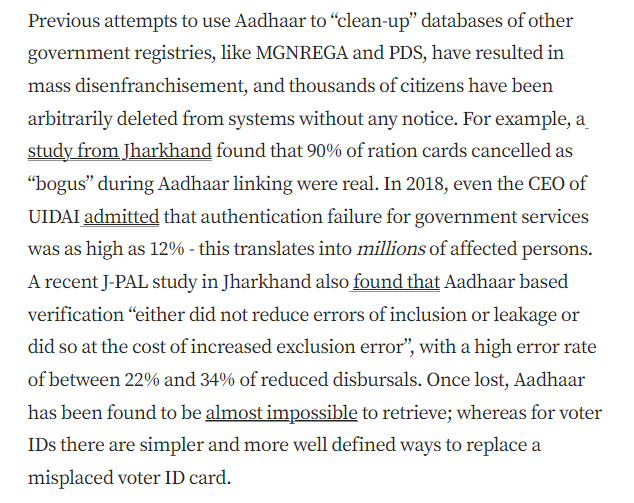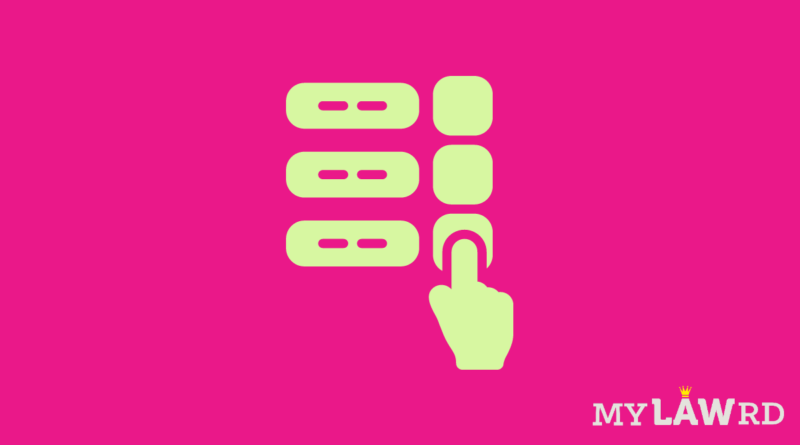Why are people worried about the Aadhaar-Voter ID linking?
The Parliament yesterday passed The Election Laws (Amendment) Bill, 2021. The law seeks to bring in key electoral reforms. The main highlight of this amendment is the linking of the Aadhaar card with Voter ID. The Election Commission was pursuing this since 2015. The Union Government claims this will weed out the bogus and duplicate entries in the electoral roll.
However, the law has got many people worried about its implications, which are far-reaching on the fundamental rights of citizens.
What are the amendments?
Provisions of the Election Laws (Amendment) Bill, 2021, allow electoral registration officers to request Aadhaar numbers from those seeking voter registration “for the purpose of establishing identity.” Officers can also ask for Aadhaar numbers from persons already included in the electoral roll for the purposes of authentication of entries in the electoral roll.
In the statement of objects and reasons, the government says it is enabling “for the linking of electoral roll data with the Aadhaar ecosystem to curb the menace of multiple enrolments of the same person in different places”.
The amendment will also bring changes to Section 14 of the Representation of Peoples (RP) Act, 1950. As such, there will be four “qualifying days” for eligible voters. Currently, only January 1st of each year qualifies. It means- those who turn 18 before January 1 can vote. Those turning 18 after that must wait for the next January 1st to register. The qualifying dates for the preparation or modification of electoral rolls are now “the first day of January, April, July, and October of each calendar year.
Sections 20 and 60 of the RP Act, 1950 will also be amended to make the elections gender-neutral for service voters. For instance, an Army Man’s wife is eligible to register as a service voter, but a woman army officer’s husband is not, under existing rules. This is why the Election Commission of India requested that the Law Ministry amend the RP Act to replace the phrase ‘wife’ with ‘spouse’.
What is the opposition saying?
Many Members of Parliament have expressed their displeasure in the way the government passed this amendment bill. First of all, the government introduced the bill only yesterday morning, and that too by way of supplementary notice.
Earlier in the day, MP Manish Tewari had opposed the introduction of the Bill and stated that the Puttuswamy judgment and the Aadhaar Act do not allow the linkage of the Aadhaar card to the Electoral right. He further added, “Voting is a legal right. Therefore this Bill is beyond the legislative competence of the Aadhaar Act.”
Shashi Tharoor also emphasized that Aadhaar was intended to serve as a proof of residence, not citizenship. Additionally, he questioned how the linking of Aadhaar and electoral lists would serve the objective of weeding out fake voters if only citizens were permitted to vote.
Asaduddin Owaisi, too, has expressed objection to the Bill, arguing that it will enable the government to profile and disenfranchise voters, thereby violating the “principles of the secret ballot and universal adult franchise.” He had also submitted a notice opposing the amendments.
Aadhaar and Cyber Security
One point worth noting here is that Aadhar is always remarked as a well-intentioned government scheme gone wrong. The benefits that the government promises are outweighed by so many flaws. Aadhar cards require citizens’ fingerprints, retina scans, and photographs. It is one of the most comprehensive biometric databases available, and it is a centralized database. Any person with a basic understanding of cybersecurity will tell you- centralization increases risks. And when there is a compromise of cybersecurity, the biggest threat is to the privacy of a person.
Aadhar’s significance and potential risk cannot be overstated. It contains data on Billions of people, and it’s a well-known fact that India’s data protection laws and software are insufficient to minimize the risk to privacy. The Attorney General of Indian once infamously told the Supreme Court that the Aadhaar Data was protected by 13 feet high, 5 feet thick walls.
Aadhar’s primary issue is security lapses, which are pervasive throughout its operation, making the system prone to numerous data leaks. UIDAI regularly shuts down a large number of websites that pose as official and phish for people’s personal information.
Around 200 official government websites made personal Aadhar data public by accident in 2018. Additionally, in 2017, the Jharkhand state website accidentally published the personal information of 1.6 million (approximately) pension beneficiaries, including their bank account information and addresses.
Aadhaar is Not so voluntary
Now the bill does say that “no application for inclusion of name in the electoral roll shall be denied and no entries in the electoral roll shall be deleted for the inability of an individual to furnish or intimate Aadhaar number”. And on the basis of this provision, the government claims that the entire exercise is “voluntary”.
But the same provision also adds, “due to such sufficient cause as may be prescribed”. Therefore, it’s not as simple as just a person refusing to link his Aadhaar with Voter ID. There has to be a “sufficient cause”.
And if you are living in India and have ever got into any paperwork, you know how “voluntary” is Aadhaar. Here’s a good example. “Delhi mandates Aadhaar for school students to avail scholarship schemes“. And this, when the Aadhaar Act clearly says children can’t be denied any service due to the unavailability of Aadhaar.
Interestingly, the Supreme Court has also said something on the issue. It observed in Justice K.S. Puttaswamy (retd.) & Anr. v. Union Of India (Aadhaar judgment) that the government has to limit Aadhaar authentication solely to welfare programs. It can also link it with PAN numbers for tax-related purposes. However, it can’t link Aadhaar with Voter IDs. Apar Gupta, the Director of Internet Freedom Foundation, shared a snippet from the judgment:
“Dis-en-fran-chise-ment”
A little help with the pronunciation always helps, doesn’t it? What it means is- the state of being deprived of the right to vote. So in the context of Aadhaar, there’s a fear that you can’t vote anymore after you link Aadhaar with your Voter ID. And why is that?
Aadhaar is not a prove of Citizenship: To vote in India, you must be an Indian citizen. And Aadhaar is neither proof of citizenship, nor identity, nor proof of birth. Further, if you turn up at the voting booth with Aadhaar and your name is not there in the electoral roll, you can’t vote. So how can Aadhaar help “purify” the electoral database?
It will cause mass disenfranchisement: To purify the electoral roll, the government will rely on just this linkage. There will be no door-to-door verification. In the 2018 Telangana Assembly Elections, people found out that the government had deleted electoral rolls of at least 55 lakh voters. And not just voter IDs, beneficiaries of other schemes have also suffered similar “exclusions”.
As Rethink Aadhaar shares, there have been multiple examples of this.

Now a very possible outcome of this exercise is: the government can deny lakhs of people their right to vote. It can be inadvertent or even intended.
There are other issues too, including:
- Fake Aadhaar cards are widespread. We have covered the issue is detail here, including an incident where Bangladeshi nationals are using Aadhaar to get passports!
- Incorrect details on Aadhaar card.
- Biometric Authentication issues with older persons, labors, and a lack of adequate grievance redressal mechanism.
Do subscribe to our Telegram channel for more resources and discussions on tech-law. To receive weekly updates, don’t forget to subscribe to our Newsletter.

